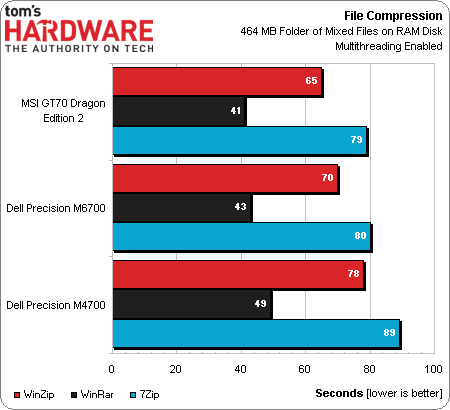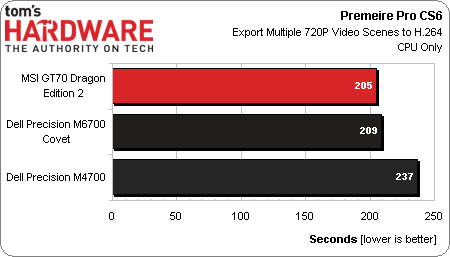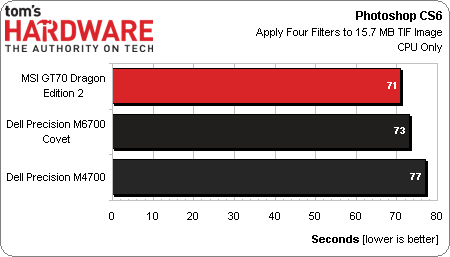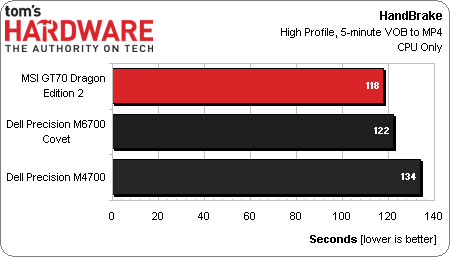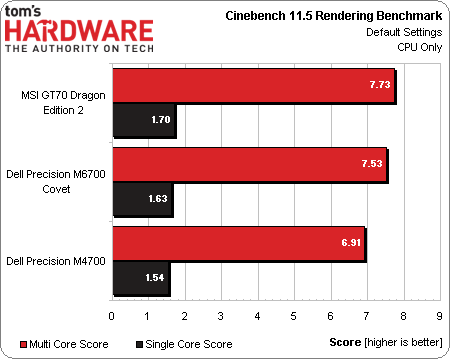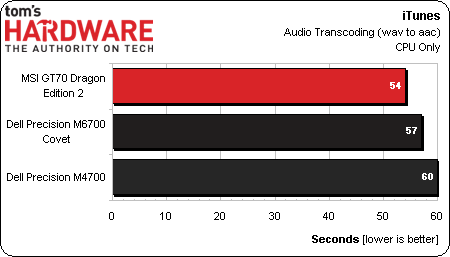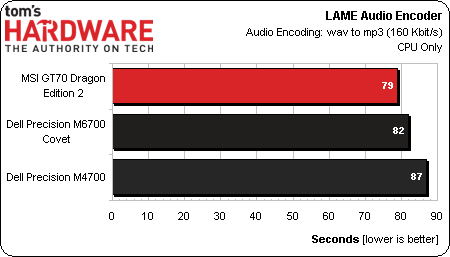MSI GT70 Dragon Edition 2 By Xotic PC: Haswell Goes Mobile
MSI's GT70 Dragon Edition 2 is in the lab, tuned up by Xotic PC. Sporting a Haswell-based mobile Core i7-4930MX CPU, Nvidia's GeForce GTX 780M, and a luxurious 17.3" FHD screen, this is one heavy-duty gaming notebook. At more than $3000, it should be.
Results: Real-World Productivity And Media Apps
The Core i7-3940XM in Dell's M6700 is much closer to the GT70's Core i7-4930MX than we expected. Then again, each Extreme Edition processor has exactly the same base and maximum Turbo Boost clock rate. Meanwhile, the M4700’s Core i7-3740QM falls behind due to its lower clock rates, regardless of utilization.
Our Premeire Pro CS6 test shows how quickly each CPU can encode an H.264-based 720p video file.
With a difference of roughly 1%, the Dell Precision M6700 is once again very close to the speed of the MSI Dragon. This is essentially the difference between Ivy Bridge and Haswell. It's tempting to think that the M7600 is keeping up without the benefit of an overclocked Turbo Boost mode, but remember that these threaded benchmarks fully tax each CPU, giving them very little opportunity to hit their top Turbo frequencies. As expected, the lower-clocked M4700 trails.
Photoshop CS6 shows slightly more distance between the two Extreme Edition processors, but it’s still only a difference of two seconds, equalling the difference between Intel's two architectures. The -3740QM is only about 10% behind. As with Premiere Pro, IPC and clock rate both play a role in defining performance. in this threaded workload.
The difference between the Core i7-3940XM and -3740QM is similar to what we saw in Premiere Pro, which makes sense given the threaded nature of HandBrake. The -3940XM is a little further behind the Core i7-4930MX, and it’s possible that the shorter test allowed the GT70's Haswell-based processor to hit a higher Turbo Boost frequency.
Moving on to Cinebench, the multi-core result reflects all four cores fully taxed, while the single-core number allows each processor to hit its maximum Turbo Boost clock rate.
Its high 4.1 GHz Turbo Boost ceiling allows the MSI GT70's Core i7-4930MX to outperform everything else. It's 4% faster than the -3940XM in the M6700 and over 10% faster than the M4700's -3740QM. Swapping over to Cinebench’s multi-core benchmark, we see similar results as previous threaded tests. The -4930MX is fastest by virtue of its Haswell architecture, but not by much. A 4% advantage in single-core processing falls to just over 2% in the multi-core test.
Get Tom's Hardware's best news and in-depth reviews, straight to your inbox.
Further exploring single-threaded performance, we turn our attention to the iTunes benchmark.
We see clear gains from the GT70's overclocked -4930MX. Results reflect clock rate differences and the small IPC throughput advantage of Haswell over Ivy Bridge.
Single-threaded performance in the LAME audio encoding test further highlights the clock rate advantage that MSI's GT70 Dragon Edition 2 holds over our two comparison machines. Once again, results are right in line with the small architectural differences and a slight Turbo Boost overclock.
Looking at the benchmarks overall, MSI's GT70 is the certainly the fastest notebook of the bunch. But with an overclocked version of the best mobile CPU Intel can make, it had better be. The advantage in threaded workloads is actually smaller than we expected, and it's possible that this platform isn't utilizing all of the chip's potential performance. Heat didn't appear to be an issue, but we'll be testing to see if MSI's operating parameters are out of the ordinary.
Current page: Results: Real-World Productivity And Media Apps
Prev Page Results: 3DMark Next Page Battlefield 3, BioShock Infinite, CoD: Black Ops II, And Crysis 3-
cobra5000 My A10 laptop w/7660g may not have the specs but it plays great and only cost me $505.99.Reply
How about that for bragging rights! -
sha7bot Forbes magazine posted a great article on this system, as well. Seems like Alienware, ASUS, and Clevo have some serious competition.Reply -
lunyone I have an AMD a6 quad core CPU w/7670 dGPU that cost me <$400 and it will game okay for most things. Of coarse it's no screamer unit, but for 95% of what I do it works just fine. Yes I would have loved to had a better system for light gaming, but my laptop fit my budget. I wish that we got off this 1366 x 768 resolution and started out at 1600 x 900 for 11-15" laptops as a minimum, but that is just me.Reply -
Ducktor Please remove the term W/h from the text as well as "Watt per hour" from the graph on page 14. This unit is meaningless! 1W = 1J/s which is already a rate of power consumption. Dividing this unit by an hour yields 1W/h = 1J/3600s^2 which actually implies an acceleration in power consumption! Such mistakes are really hard to accept on a technical site like Tom'sReply -
danwat1234 Yea, the 180w ac adapter in this laptop, and also in the Gt60-2od laptop (the 15" version of this laptop) should really come with a ~240w AC adapter like what the Asus G750 has, but it doesn't. So they made NOS to adapt.Reply
It is unfortunate. What if I want to crunch on the high-end CPU and the GPU 24/7 for some reason? Can't do it with a 180w AC adapter.
To those thinking that the built in single fan isn't good enough, it is a 12V fan! I have never seen a 12V fan in a laptop before but this one has it. The Coolerboost feature ramps up the fan RPM to maximum and really keeps the temperatures down.
There are some reports of bad paste jobs so if you are having high temps, that may be the reason. Call up MSI to verify that your warranty will not be void and then repaste it. MSI is cool in that they'll usually allow you to take off the heatsink whereas Asus won't.
Thanks Tom's for making a much better review than what Anand did!
So on page 14, the max power draw from the battery when the laptop is unplugged and you are gaming is only 85 watts? That must mean that the dedicated graphics is shut down and the HD4600 is only on? Can you have the 780m when on only battery power? -
luckiest charm I would feel awkward using this machine in trains, at relative's places, or anywhere else I can be spotted on so I don't become a laughing stock. :PReply -
custodian-1 With the problem with cell phones being stolen I would not take something out of the case.Reply -
boro169 I think it should be noted that derived notebooks from this like deviltechs are much cheaper. the starting point of msi is 2400 euros in my country and deviltechs modified msi cost me 2050 with a 250gb samsung 840 and a 1 tb 5400 hdd and the 780m.. yeah it doesn't have the steelseries keyboard it has de gt60 blue blaclight one but...Reply
for those talking about its not for hardcore gamers... I think they are wrong because i can't take my cosmos II tower with the 3930x and my titan on my back when i visit my girlfriend on train a 300km away from my home... and not everybody can have two of those beasts.. the desktop is always better but you can't drag it always with you to trips...
for the one talking about being scared of being robbed... I don't know why he walks on the streets wearing a wallet you COULD be robbed... or a plane could crash on your head.... ¬¬ then nobody would buy an smartphone. because to use it indoor and using outdoors and old nokia because if it is robbed its not an expensive lose....
if you at least talked about the processing power lose when not wall plugged or so that would be a reasonable comentary... -
warezme You know the new Haswell GTX780m Alienware models have been out for awhile. You should have done your comparison with one of those. LIkely more expensive but more direct comparison.Reply
